Compiled by: Loxia
The lemon problem and the crisis of trust
Today I am not going to talk too much about technology, I am going to discuss a social problem we face in the crypto space. The title of this speech is "Social Consensus and Self-Regulation". I would like to ask everyone first, has anyone heard of the "lemon problem"? Does this term have any impression?
Well, not really impressed, not really.
Well, the American slang for a "lemon" is a car that is unreliable and you don't know it's going to be unreliable. I'm not sure where the word originated, but that's what it means.
Well, good and reliable cars are called "peaches". I didn't know this before, but I found it out after looking it up. It's pretty cute.
The lemon problem is basically the problem of used car dealers. You go to a used car market and it looks a little like this, and it feels a little cheating because you don't know if the car you buy is going to be a peach or a lemon. This is also a big problem in crypto today - everything looks like it could be a peach, but in fact many protocols are lemons.
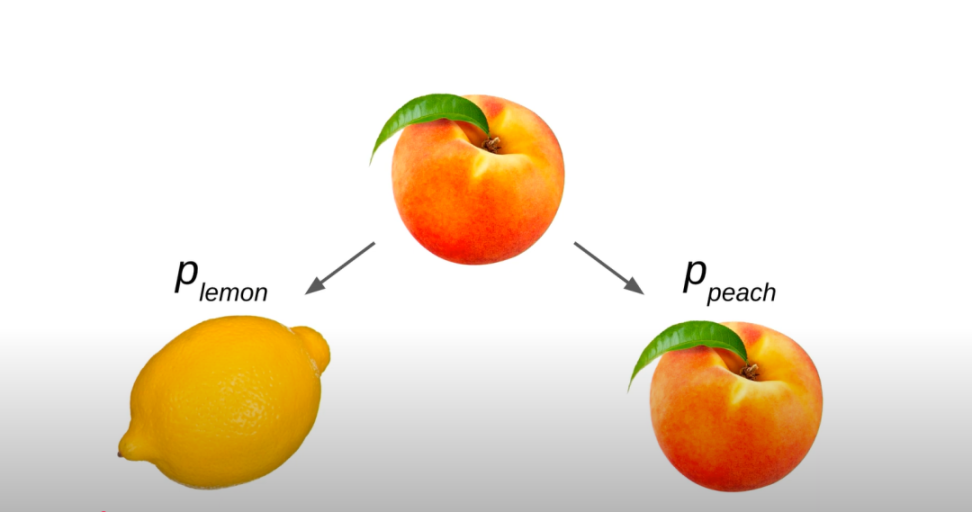
So when you buy a car or use a protocol, there is a certain probability that it is a peach and a certain probability that it is a lemon. So what is the price you are willing to pay for it? What is the expected value weighted average price you are willing to pay for something that is likely to be a peach or a lemon?
What price would you be willing to pay for that? It’s like some kind of weighted average that we can all internalize — there’s a certain probability of a lemon times the value of a lemon, plus a certain probability of a peach times the value of a peach.

You might intuitively think that the price you’d be willing to pay is somewhere between what you’d pay if you knew it was a “peach” and what you’d pay if you knew it was a “lemon.” So why is this a weird dynamic, and why are we talking about fruit at all?
So what incentive does this provide for a used car dealer? If you know that everyone will pay a price somewhere between a peach and a lemon, what is your incentive?

Your incentive should be to only sell lemons, right? If people are willing to pay more for lemons, there’s no reason to sell peaches. You can just sell them lemons.
This is often called a scam.
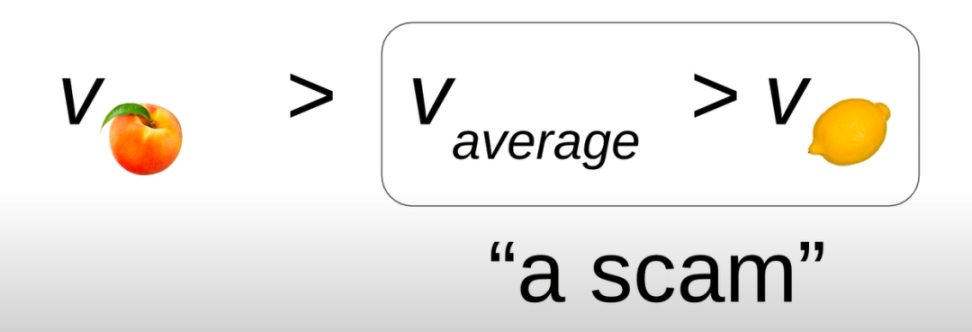
Well, I want to pause for a moment and this is a big problem facing the crypto space today - the lemon problem.
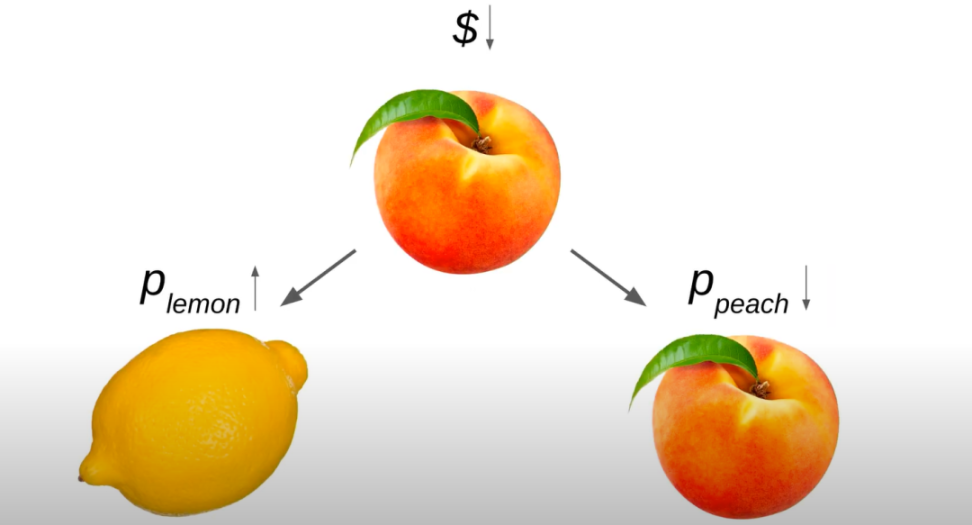
Well, the dynamic in crypto today is that the probability of peaches has actually gone down because of this lemon problem, fewer and fewer people are willing to grow peaches because they are expensive, and lemon dealers are flooding the market because they think wow, I can just sell lemons to people who are willing to pay more for my product than it is actually worth because they were misled into thinking it is a peach. Overall, users are less willing to participate in the ecosystem, which makes sense.
Now I can hear some of you in my head, or your imaginary interlocutors saying, “This is the price of permissionlessness, we have to accept it with a mix of good and bad, like a 30% discount in crypto, you know that’s the reality.”
But this is not a one-time cost, the lemon problem is not a one-time cost, it is actually a death spiral.
Because when our trust level decreases, it becomes harder for peaches to outperform lemons, and when peaches exit the market, we are left with lemons, which is not a good place to be.
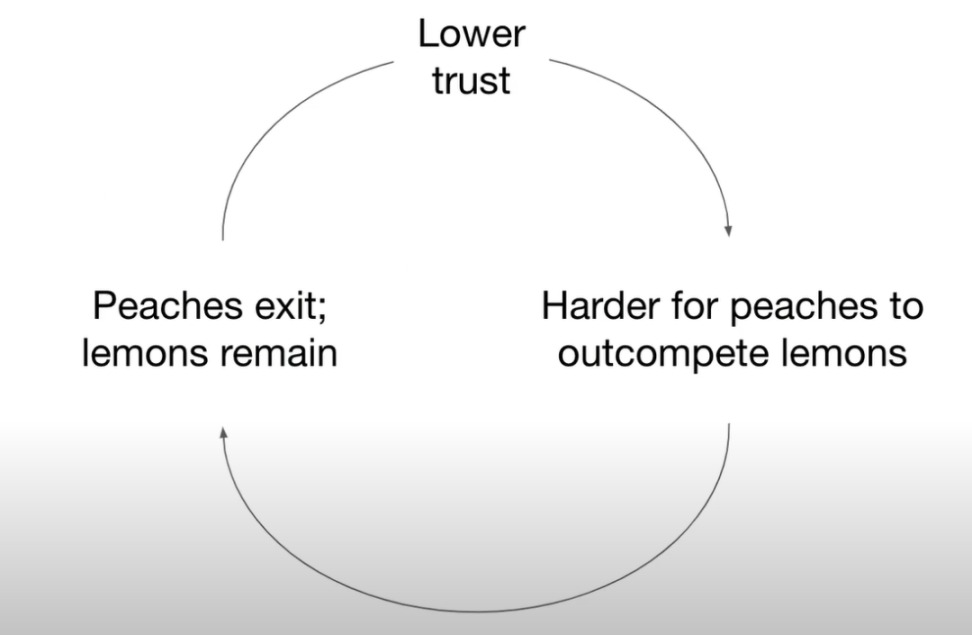
So we need to somehow help consumers identify lemons, and I would say if we don't, Gary will - in fact he has tried very hard - so that's why I'm pushing that if we want to maintain the spirit that we've developed in crypto and solve the lemon problem, we need some form of self-regulation.
Let's compare this to something that's done well, and this might be controversial.
Casino model: building a trust mechanism for safety and fairness
Okay, what am I talking about?
So am I saying crypto is a casino?
No, I mean crypto is not even as good as casinos.

We need to be at least as good as the casinos. If cryptocurrencies work,
We need to at least do what the casinos do well,
I think it's worth a look, which is what I'm going to talk about next.

The casino has a reputation for being fair and safe, and they promote that heavily. Why would they do that? They go to great lengths to prove that the casino is not rigged, except of course in the way that it clearly is.
Let me give you some examples. This is an automatic card counting machine.
Um, why would they do that? Why would they switch to this instead of having a dealer manually deal the cards?
They want to prove to you that you’re not being deceived, except of course in the way that you’re structurally deceived, but they want to prove to you that this is verifiable randomness.
They ban cheaters and share cheater information with other casinos. Why would they be willing to band together against cheaters? If I were Flamingo Casino (a casino in Las Vegas) and I found a cheater, why would I share that information with the winners?
They have these dice calipers to make sure the dice are evenly weighted, all to convince the consumer that you are not being ripped off, you are playing fairly, and even though the odds are against you, you are not being scammed or ripped off.

The government and casinos actually co-invest in making casinos safe. We forget that casinos are very legal and growing very fast, you know Ethereum is on track to do $2 billion in fee revenue this year and the global casino industry is on track to do $300 billion in revenue.
Marketing safety is one way casinos have been very successful working with the government to convince them that making this thing safe is good for everyone.
Okay, so how does this work? It’s a virtuous cycle, higher trust equals more users equals investment and fairness and security,

So we need to do this in a decentralized way. We know for a fact, three letters that I haven't heard in any conversations this week - FTX, nobody's talking about it, we like to pretend it's just a nightmare, you know, bad actors really eroded the trust of the entire ecosystem, not just the people they targeted, but everyone.
Self-regulation and social consensus driven by zero-knowledge proof
But we have the technology to prove security and legitimacy, we just need to adopt it at the societal level, so the necessary hand-waving this week - zero knowledge, right? That's a term we all know.
We have the ability to prove integrity, to prove the integrity of identity, reputation, and computation.
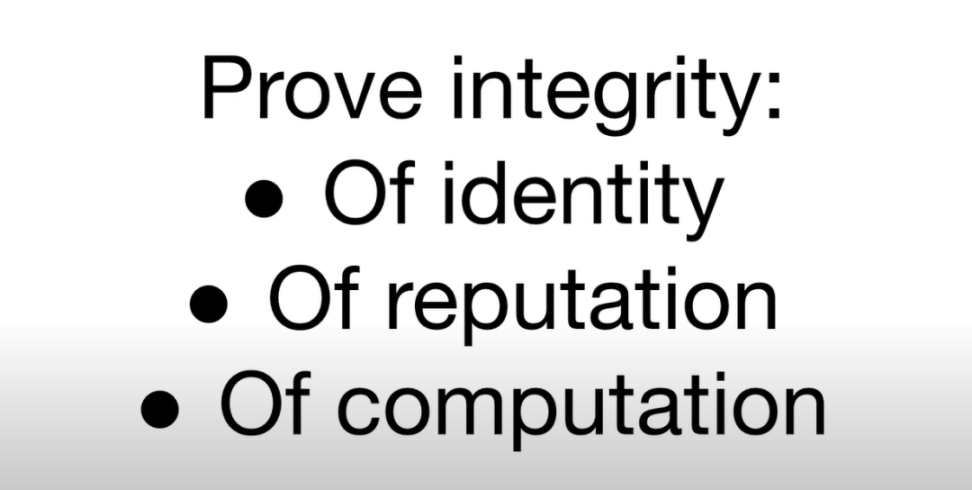
The problem is not technology, we keep going to these meetings and talking about technology, part of the problem is actually social consensus and ideology.
We know we have the power to create new forms of social consensus around protecting applications and users, and we need to accept that this is something we have to do, and we need to regulate ourselves before we can be regulated by others.
So I think we're very extreme ideologically, either completely permissionless or completely permissioned, it's either black or white, it's either this or that.
But in reality, there is a very broad spectrum of social consensus in between.
Let me give you an example of what ZK and ASICs are ultimately going to unlock - this is just anathema to ideology, you know, only third parties who can prove the legitimacy of the funds can identify the token holders and let them enter a pool. This can be both permissionless and permissioned. I can build a pool with these rules and you can choose whether to enter or not, so we have this concept of libertarian paternalism.
Someone, somewhere, like social consensus in this room, is going to decide that this is how we operate securely, and then the users decide what they want to do, rather than us being completely black and white and allowing anything, even social, even democratic, to be allowed.
Another example is the concept of decentralized cleaning providers that Vitalik and our co-founder Zach Williamson have been working on, which is a social graph where individuals attest to the legitimacy of your funds and transactions, and they look at behavior and say this is not something we want to be associated with. This is very different from centralization, very different from censorship, this is a democratic form of social consensus, it's all of us saying we are not going to tolerate certain behavior in our ecosystem.
The goal here is to still allow users to express their preferences among various protocol designs, not to restrict freedom, but to give users more choices than I'm saying right now.
So ZK implements this permissionless approach at the base layer, while providing permissioned social consensus at the application layer.
These are just more examples, you know there's a lot of discussion about proof of reserves, anti-phishing, opt-in compliance pools, proof of legitimate funds.
But all of this is to say that we need to turn zachXBT into ZK, we need to use math and social consensus instead of trust or centralized compliance.
So to summarize, we need ZK to unlock three major improvements.
First, we need to preserve user choice while allowing for self-regulation and compliance, we as a community and ecosystem haven’t really talked about self-regulation yet, we just hope and pray that others won’t notice.
We're not going to get there, Web3 is not going to succeed if we allow this to happen. We need to prove to someone that we're taking care of each other and our users, so we need to prove to our users that we as a community have their backs.
Let’s not try to impose ideology on users, let’s give them the choice of where they want to go, which is ultimately what this space is about, it’s about freedom, about autonomy.
Finally, we need to improve security, we need to make it reliable, we need to make encryption a necessity, not an option. We forget that the government is at least allegedly made up of voters, why was Uber and Airbnb once illegal and now legal? Because someone walked up to the steps of Congress and said, "You can't take my Uber away unless I die." Someone did it, an individual did it, I don't know if you remember it.
One way we make crypto a necessity and integrated into the fabric of our economic life is to ensure it is reliable and secure, and that we support our users.
This is how we turn lemons into peaches.

This issue brings you a video from BlueYard Capital posted on Youtube: "Jon Wu (Aztec) @ If Web3 is to Work... A BlueYard Conversation"
Original video link: https://www.youtube.com/watch?v=o17GnPJXxgU&t=244s












